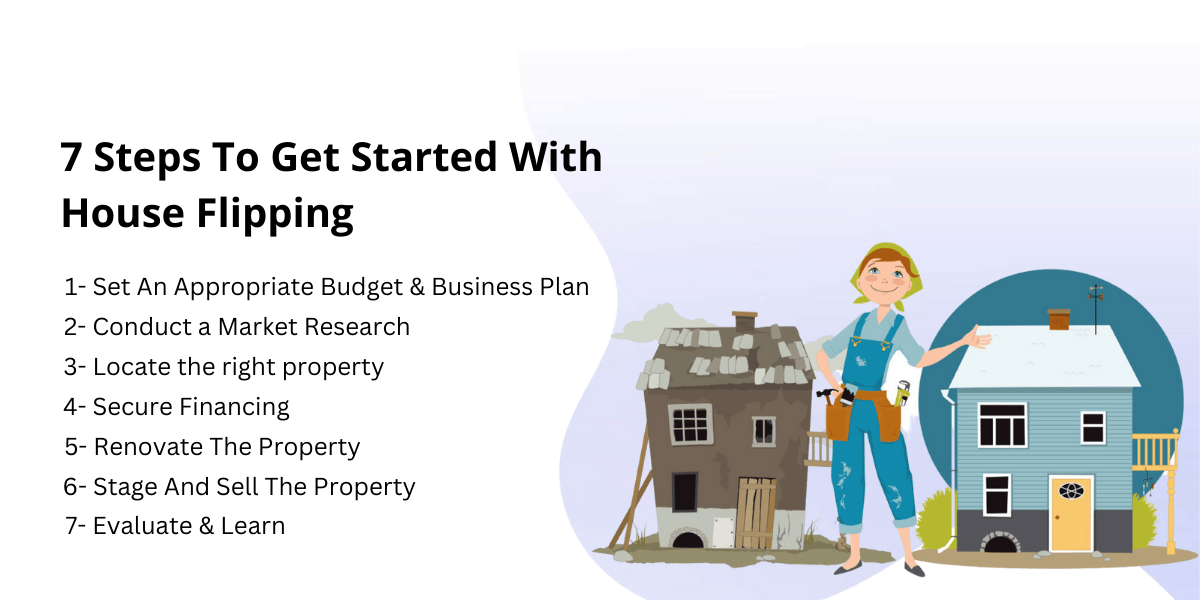If you’re interested in Real Estate investing, flipping houses can be lucrative. But how do you start flipping houses? Adopting this strategy requires caution and proper planning, as it’s not similar to just buying and selling a house.
In this blog post, we’ll walk you through how you can start flipping houses? How you can get profit through flipping houses and many more you can learn through this blog.
What Is House Flipping?
House flipping is a real estate investment strategy in which an investor purchases a property, renovates and sells it for a profit. The main objective of house flipping is to buy a property at a lower price, improve it to increase its value, and sell it at a higher price.
Besides this, flipping houses requires careful business planning, renovation management cost, and an overall understanding of the real estate market. The best thing is successful house flipping can generate a better ROI which is a beneficial turn.
Furthermore, flipping houses negatively impacts unexpected renovation expenses and housing market crashes.
What is the 70% rule in house flipping?
The 70% rule is a guideline that’s commonly used in the real estate industry to flip houses. It states that the purchase price of a house should not be more than 70%. It will help you avoid spending on a flipping property that generates a little return on investment.
Consider that you think a house will be worth $30,000 following repairs. To begin, multiply $300,000 by 0.7, or 70%.
$300,000 x 0.7 = $210,000
Let’s assume that it requires $60,000 in repairs. Subtract $60,000 from $210,000 to arrive at the maximum price you should offer for the house.
$210,000 – $60,000 = $150,000
Thus, the home’s purchasing price must not exceed $150,000 in cash (more on the cash later).
How long does it take to flip a house?
The overall time it takes to flip a house depends on several factors. These factors include the renovation process, the local real estate market, insurance, utilities, and investor experience.
Generally, a typical house flipping can take a few months or years to complete. The renovation process takes several weeks or months which depends on the house’s condition and the type of renovation needed.
After the renovation process is complete, the next step is to list the property for sale, which takes additional time (several months or years) depending on the property value in the market. Other factors affecting the process of flipping houses include:
- Obtaining necessary approvals and permits.
- Coordinating with contractors and other professionals.
- Dealing with other issues during the renovation process.
It’s essential for investors to carefully plan and manage their timeline to ensure that they can renovate and sell the property on time.
7 Steps To Get Started With House Flipping

To start flipping houses, follow these 7 golden steps:
- Set An Appropriate Budget & Business Plan
Before you start flipping houses, you must set your goals and budget. Determine how much money you can afford to invest in an appropriate property, set your goals, and set your profit for each project.
Now consider other factors such as your level of experience in the Real Estate market, available resources to flip a house, and how much risk (tolerance) you can bear for losing aspects.
- Conduct a Market Research
Once you have defined your goal and budget, the next step is to look for an appropriate market in your nearby area. Conduct appropriate market research and look for areas with high property demand and low supply.
Additionally, consider the factors valuable in your market research process, such as demographics, location and market trends, local economic conditions, housing prices, and vacancy rates.
- Locate The Right Property
After conducting market research, find the right property that fits your goals and budget. Find a distressed property or inspect a house that is undervalued and in need of significant repairs and consider the property’s potential resale value. You can hire a professional real estate agent and start working with them, and you can utilize online resources to get the right agent for your property.
- Secure Financing
It’s essential to secure financing before you get started. You need to require a handsome amount of capital to flip houses. Do proper research and explore your options for loans, partnerships, and investors to find the best financing option for your current project.
You can search online or offline; if you go online, you need to check out the essential factors such as their terms and conditions, repayment schedule, and interest rates. And if you go with an offline process, you must be careful while selecting the best option for your project.
- Renovate The Property
After you have secured financing and purchased the property, it’s time to renovate it and improve its conditions. For this, you need to work with expert designers and contractors and make a list of requirements to make that property value. It would help if you also focused on the factors such as property conditions, local house marketing, and the potential buyer’s preferences.
- Stage And Sell The Property
Once your renovation is complete, it’s time to sell the property. It would be best to work with a real estate agent to create a market plan and consider applying your property’s best home staging ideas to make it more appealing to potential buyers. Now set a reasonable price for your property based on the local housing market and house condition. Setting an affordable price in your neighborhood or nearby area is a good idea.
- Evaluate & Learn
It’s crucial to assess the project and draw lessons from your experience after you sell the house. Evaluate your earnings, accomplishments, and shortcomings, and utilize the results to inform your upcoming home-flipping endeavors. Take into account elements like your marketing plan, renovation costs, and return on investment.
What Is The Average Net Profit For Flipping A House?
The average net profit for flipping depends on several factors, including the house location, renovation cost, overall real estate market condition, and others. A house flipper’s profit depends on the situation and their experience. Many investors make $100,000 or more, while others earn less than $20,000. If all factors are aligned, the average investor makes a $30,000 net profit on a house flip.
How to find houses to flip?
Finding houses to flip can be challenging, but you can apply powerful strategies to make your properties stand out. Additionally, you don’t need a real estate license to flip houses but it can be a plus point if adopted. Here’re some strategies you may apply to flip your house:
- Firstly, search for real estate markets in your area to start flipping houses.
- Connect with real estate agents who specialize in selling outdated and investment properties.
- You can search online real estate marketplaces and can also filter your search.
- You can attend foreclosure auctions as these provide discounts over properties.
- Use social media to look for properties to flip.
Best cities for house flipping
Here’s the list of the top 10 best cities for house flipping:
- Las Vegas, Nevada
- Phoenix, Arizona
- Tampa, Florida
- Atlanta, Georgia
- Dallas, Texas
- Houston, Texas
- Charlotte, North Carolina
- Indianapolis, Indiana
- Nashville, Tennessee
- Kansas City, Missouri
Mistakes to avoid when flipping a house
Flipping houses can be a profitable investment strategy, but most investors make mistakes to earn a profit. They consider these mistakes minor but these mistakes become more significant in the end. Here is the list of mistakes that you shouldn’t make:
- One of the common mistakes people make is that they don’t understand the cost of flipping a house correctly.
- Secondly, people over-improve their property, that’s a loss in property cost for them.
- Third, they fail when hiring the right professional for a particular post, such as plumbing, electrician, etc.
- As real estate is all about earning a profit, they have to research the right property, but most of the users don’t do proper research, and in the end, they face failure.
- Rushing the process can lead to mistakes and oversights when flipping a house. Plan your project carefully, hire the right professionals, and ensure every step is completed correctly.
The Bottom Line
So, flipping houses requires proper research, business planning, and hard work. If you want to start house flipping, it’s crucial to understand the real estate market well and start your project. Make sure you avoid mistakes and get a handsome return on investment (ROI) to approach the next project efficiently and successfully.




















